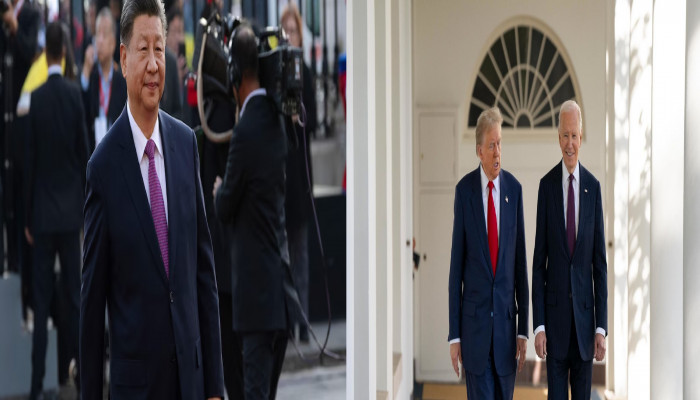Xi Jinping extends olive branch to Trump, but draws firm red lines on China
- In Reports
- 01:28 PM, Nov 18, 2024
- Myind Staff
During his last meeting with Joe Biden, Xi Jinping made it evident to Donald Trump that while China wants to be friends, but is also prepared to fight if necessary. Since Biden is scheduled to leave the White House in January, China's leader used Saturday's meeting to outline his strategy for dealing with Trump. The goal is to find a solution for the two largest economies in the world to work together. Xi has emphasised that a war between the US and China is not inevitable and that they should avoid a "new Cold War."
He then reiterated China's "four red lines," indicating that Trump must refrain from taking any actions that would weaken the Communist Party's hold on power, push the country towards democracy, restrain its economic growth, or promote Taiwanese independence. CCTV and other Chinese state media seized on the mention of the "four red lines," claiming that it set the tone for future relations. Following their meeting with Biden at the APEC conference in Lima, Peru, Xi issued a statement saying, "They must not be challenged." "These are the most important safety nets and guardrails for China-US relations."
Xi Jinping's detailed statement after his farewell conversation with the outgoing U.S. president reflects China's cautious optimism. While hoping for positive relations, China is also preparing for potential challenges. Trump has threatened to impose 60% tariffs on Beijing and has chosen several China hardliners for key foreign policy roles, including Marco Rubio as Secretary of State and Mike Waltz as National Security Advisor, signalling that no issues will be off-limits. Trump has questioned how much the U.S. should support Taiwan and has become closer to Elon Musk, Tesla's CEO, who has significant business ties in China. In 2023, Musk called Taiwan an "integral part of China," which upset Taiwan's leaders.
It’s uncertain whether Trump’s tariff threats are a starting point for negotiations, like during his first term, or if he’s now more focused on countering a major US rival. At the APEC summit, JPMorgan Chase CEO Jamie Dimon suggested that Trump’s warnings about tariffs might be a strategy to bring governments to the table for talks. Dimon also encouraged attendees to read Trump’s book, The Art of the Deal, for insight into his approach. Xi Jinping indicated that China is willing to discuss economic issues as long as they avoid sensitive topics, especially Taiwan. Taiwan is a democratic island that China has vowed to reclaim, even by force if needed. After meeting with President Biden, Xi made a notable comment, directly mentioning Taiwan's leader, Lai Ching-te, by name for the first time. He urged the US to recognise Lai’s intentions of pushing for Taiwan’s independence.
Although he did not specifically mention the Southeast Asian nation, Xi cautioned the US to avoid interfering in its territorial conflicts with the Philippines, a US treaty partner and urged Biden not to support any "impulsion for provocations" to the South China Sea's flashpoints. Additionally, Xi attacked the US strategy of a "small yard and high fence," a phrase that US National Security Advisor Jake Sullivan came up with to characterise the US's attempts to prevent China from gaining access to advanced technology. Xi Jinping's warnings to avoid discussing human rights and democracy were unclear, but he has been worried about potential US efforts to stir up unrest. At the same time, China's growing economic problems could lead to more frustration with its government.
China often makes vague warnings, and these statements don't always mean that any specific action will lead to war. In a briefing after the meeting, Sullivan mentioned that such statements are common in Beijing. “The message of ‘choose wisely, not wrongly’ is a pretty standard, fair PRC statement that they’ve made repeatedly over the course of these past four years, the four years before that, and so on,” Sullivan said. “And that’s especially been true where the relationship has taken on a more competitive dynamic.” A White House summary of the meeting said the two leaders highlighted the need to manage the competitive parts of their relationship carefully, avoid conflict, and maintain communication.
Xi aimed to describe the US's stance toward China more broadly than before, regardless of his intentions. The Chinese readout included six “no’s,” compared with four after Xi met Biden in Bali, “The United States does not seek a new Cold War, it does not seek to change China’s system, its alliances are not targeted against China, it does not support ‘Taiwan independence,’ it does not seek conflict with China, and it does not see its Taiwan policy as a way to compete with China.” The big question now is whether Trump and his cabinet members will agree that this is true.







Comments